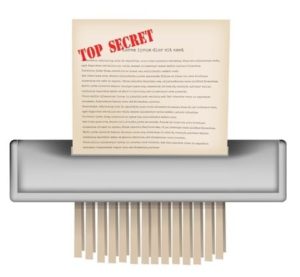
Brookshire Brothers, Ltd. v. Jerry Aldridge
In an opinion delivered July 3, 2014, the Texas Supreme Court answered a certified question from the U.S. Twelfth Circuit Court of Appeals asking 1) whether the trial court erred by admitting spoliation evidence – evidence of the intentional destruction, mutilation, alteration, or concealment of evidence – based on the grocer’s production of an 8-minute clip of security footage but retention of the longer video and 2) whether the trial court erred by instructing the jury on spoliation – placing the burden of proof on Brookshire Brothers.
The Facts:
Jerry Aldridge slipped and fell at a Brookshire Brothers grocery store on September 2, 2004. He did not tell store employees that he was injured, and the store did not investigate the fall at the time. About an hour-and-a-half later, Aldridge went to the emergency room because of pain. On September 7, he reported his injuries to Brookshire. A store manager trainee prepared an incident report, stating that Aldridge slipped on grease which leaked from a container of rotisserie chicken, located approximately 15 feet from the fall.
Brookshire Brothers saved approximately eight minutes of security footage, showing the scene of the fall just before Aldridge entered the store and concluding shortly after his fall. Aldridge’s attorney requested approximately two-and-a-half hours of additional footage from the store cameras. Brookshire Brothers refused because the footage had since been overwritten by new footage. Aldridge alleged that Brookshire Brothers was withholding relevant evidence, and submitted evidence of spoliation.
The Court’s Analysis:
The Supreme Court of Texas held that the trial court abused its discretion by admitting the spoliation evidence and giving the jury an instruction on spoliation. It concluded that a party must intentionally spoliate evidence in order for a spoliation instruction to constitute an appropriate remedy. In Texas, the instruction is based on a wrongdoing presumption. Therefore, a requirement of intent to conceal or destroy discoverable evidence is more appropriate.
The Court held that there was no evidence proving that Brookshire Brothers had and breached a duty to reasonably preserve evidence, with the requisite intent to conceal or destroy relevant evidence. The spoliation instruction placed a presumption of wrongdoing on Brookshire Brothers. Therefore, the trial court abused its discretion by submitting a spoliation instruction to the jury.
In concluding, the Court reemphasized that no evidence supported the idea that Brookshire Brothers attempted to conceal relevant, inculpatory evidence. Rather, Brookshire Brothers preserved exactly what it was asked to preserve – the footage of the fall.
What to Take Away:
In Texas, the state of the rules concerning spoliation evidence is not entirely clear. Even still, these rules on spoliation evidence apply not only to premises-liability cases, but to all types of cases. This case identifies a requirement for spoliation evidence of intent – intent to conceal or destroy discoverable evidence. Aldridge failed to prove that Brookshire Brothers had such intent in saving and producing only eight minutes of camera footage, and therefore, the spoliation evidence was improper.

